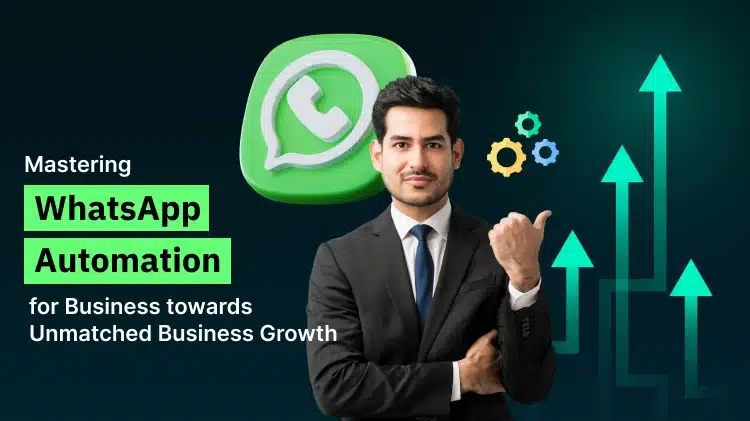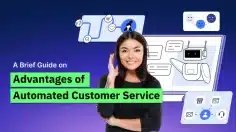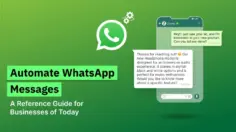WhatsApp Automation for Business: The Perfect Guide for Business Growth
The conversation reigns supreme in the hyperconnected digital economy of today. Consumers now demand conversation and expect it on the platforms they use most frequently. They no longer want to be passive recipients of marketing communications. With more than two billion users worldwide, WhatsApp has become the most widely used messaging app and is without a doubt the epicentre of private communication.
This is a very bigger opportunity for businesses.
Large-scale one-on-one interactions with so many people however present operational and transportation challenges. This is where WhatsApp automation for business turns into a vital requirement for survival and expansion rather than merely a tactical advantage.
This guide will demystify WhatsApp automation’s power and offer a viewpoint on how to use it to improve customer engagement expedite processes and generate real revenue growth. With the help of convincing data and practical examples we will examine the why and the how making sure you have a comprehensive success plan.
Your customer’s favourite chatting app just became your most powerful sales channel. Let us explore – WhatsApp automation for business.
- The Paradigm Shift: From Marketing to Dialogue
- The Foundation: WhatsApp Business App vs. WhatsApp Business Platform (API)
- What is WhatsApp Automation and Why You Need It?
- How to Automate WhatsApp Messages
- Steps to Get Started WhatsApp Automation for Business
- Selecting the Best Automation Tool for WhatsApp
- Conclusion
- Frequently Asked Questions
Table of Contents
The Paradigm Shift: From Marketing to Dialogue
In the past, communication between businesses and their clients has only been one-way. Consider bulk emails broadcast SMS or generic posts on social media. However, the modern consumer has a low threshold for friction and a short attention span. Customers want a smooth, customized experience right away. This represents a fundamental change in behaviour and psychology.
Since they have more control now consumers prefer to interact in a way that feels immediate and personal and on their own terms.
Recent data upon research clearly illustrates this change and WhatsApp’s unmatched effectiveness as a communication tool. WhatsApp Automation tools are available across the globe for businesses now.
Automatic WhatsApp messaging is a routine practice today.
Unlocking Real Connections
WhatsApp is a goldmine for business communication. Imagine having a conversation with a customer and knowing your message has a 98% chance of being seen. That’s the reality with WhatsApp, which completely outshines the average email open rate of just 20%. In a world of overflowing inboxes, this level of direct connection is a total game-changer.
Your customers already love this.
A massive range of 67% of people prefer messaging for customer support over calling or via emailing. Why? As it’s fast, easy, and they may do it with their convenient time. They do not need to wait. They can send a quick message.
On each single day, more than 175 million people across the globe are actively talking to businesses on WhatsApp. This isn’t just about personal chat; it’s become the go-to way for people to engage, ask queries, and purchase things.
For businesses, this transforms into real-world benefits. They are using WhatsApp for support and have seen a 30% faster response time. That speed develops trust and loyalty in a way that static marketing messages simply can not. These numbers are not just statistics; they give a fundamental shift in how people want to communicate with the businesses they prefer. Those who get on board and offer a great conversation experience are those set up for mind-blowing growth.
The Foundation: WhatsApp Business App vs. WhatsApp Business Platform (API)
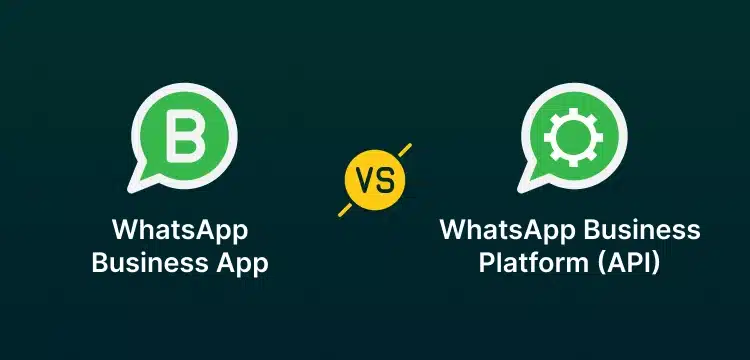
Before going in depth into the world of automation, it’s required to know about the 2 main tools available to businesses.
- WhatsApp Business App: This application is free, specifically made for individual business owners, small enterprises. A business profile a product catalogue greeting and farewell messages and fast responses are just a few of the basic automation features that make it an excellent place to start. It’s ideal for small teams or one person operations but it has a lot of drawbacks like only being able to connect to one phone and having little integration and bulk messaging functionality.
- WhatsApp Business Platform (API): This is the enterprise-grade scalable solution designed for medium-sized to large enterprises. WhatsApp Business API is a gateway that enables companies to link their WhatsApp number to a third-party software provider it is not a standalone application. The only way to send extensive campaigns manage conversations with a team of agents integrate with your CRM and accomplish true automation is in this manner.
The API enables every advanced automation that we will cover in this guide.
What is WhatsApp Automation and Why You Need It?
Fundamentally WhatsApp automation uses software to manage customer interactions and conversations automatically. A customer can be guided through the entire purchasing process by an AI-powered chatbot, or it can be as straightforward as an automated welcome message.
Making your company accessible around-the-clock without requiring a massive staff is the main goal. You can make sure that no customer inquiry is left unanswered and that no lead is lost by automating crucial procedures.
The benefits are huge:
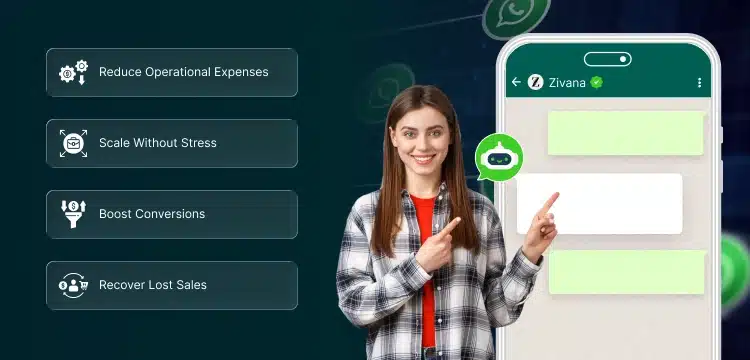
- Reduce Operational Expenses:
Businesses have reduced their support expenses by as much as 30% by implementing a WhatsApp chatbot. Where is my order? and other routine frequently asked questions are handled by the bots freeing up your human agents to work on more significant problems that require a human touch.
- Scale Without Stress:
The volume of your communications increases dramatically as your business expands. Managing more conversations without hiring more employees is possible with WhatsApp business automation. With the aid of a clever chatbot an agent can now oversee dozens of conversations simultaneously.
- Boost Conversions:
Conversion rates from a well-run automated WhatsApp messaging campaign can reach 45–60% which is significantly higher than the usual 2–5% from SMS and email. By fostering trust and facilitating quicker decision-making the conversational personal format converts browsers into buyers.
- Recover Lost Sales:
Using WhatsApp automated reminders can recover up to 70% of cart abandonment. Because it reaches the customer on a channel, they use daily a timely personalized message with a discount is incredibly effective.
How to Automate WhatsApp Messages
Automated WhatsApp message is a reality today. To fully benefit from automation, you will need to have a firm grasp of how it operates and have access to the WhatsApp Business Platform (API).
The API makes a distinction between two primary message types:
1. Real-time Free-form Messages: They sent within 24 hours of a user’s most recent message are known as session messages. They don’t need pre-approval and are ideal for customer service discussions.
2. Template Messages: Even after the 24-hour window has ended you can still send proactive pre-approved structured messages using these.
The three types of these are crucial for transactional and marketing communications.
- Marketing Templates: For retargeting promotions and deals.
- Utility Templates: For reminders about payments shipping updates and order confirmations.
- Authentication Templates: One-time passwords (OTPs) and verification codes can be sent using authentication templates.
The main categories of automation will now be examined.
- Quick Replies and Autoreplies: They are the fundamentals. New users are greeted with an autoreply, and your team can react quickly with quick replies which are pre-written responses to frequently asked questions.
- Chatbots: The most sophisticated type of WhatsApp automation is chatbots. AI-powered dialogues known as chatbots can guide users respond to inquiries and even finish transactions. While a more advanced bot can qualify leads and direct them to the appropriate individual a basic bot can handle frequently asked questions.
- Trigger-based Messaging: Messages are automatically sent in response to certain actions such as a cart abandonment or a purchase. For instance, when a customer places an order, they receive a personalized message instantly when their package is on its way they receive a shipping notification. This can reduce calls asking- “Where’s my order?” by 80%.
- Broadcast and Bulk Messaging: The API enables you to simultaneously send customized extensive campaigns to thousands of opted-in users in contrast to the apps limited broadcasts.
Steps to Get Started with WhatsApp Automation for Business
Feeling stressed? No worries. Starting with WhatsApp automation for business is a clear, stepwise process. Let us refer these given steps:
Step 1: Join with a BSP
Your first step is to select a WhatsApp Business Solution Provider (BSP). These are the official partners who handle the tricky technical stuff. They offer you a simple interface to create your flows and manage everything without any issue of working with the API directly.
Step 2: Verify Business on Facebook
As WhatsApp is a Meta’s product, you want a verified Facebook Business Manager account. This ensures that your business is legitimate and unlocks high messaging limits.
Step 3: Get a Committed WhatsApp Number
You’ll require a unique phone number just for your API-based WhatsApp interaction. This number can’t be joined to any present personal or business account.
Step 4: Create and Get Templates Approved
Any proactive messages you want to send must be pre-approved by WhatsApp. You’ll write these template messages and submit them. They can include personalized details like names or order numbers.
Step 5: Build Your Flows
Use your platform’s visual builder to design conversations. Start with something basic such as a greeting that points clients to the appropriate division. Then construct increasingly intricate flows such as an automated abandoned cart recovery sequence.
Step 6: Your System Integration
Your new WhatsApp automation platform should be connected to your CRM and other business tools. A reminder about an abandoned cart that contains the customer’s name and the exact items they left behind is one example of a truly personalized message that requires this.
Step 7: Start and Lean
Start with a modest campaign and use your analytics dashboard to closely monitor the outcomes. Keep an eye on your quality rating which is based on how users respond to your messages. For your communication to scale a high rating is essential.
Selecting the Best Automation Tool for WhatsApp
Though there are many options available picking the best one is essential. What to look for is as follows. To follow WhatsApp guidelines and assure the safety of your account, you must hire services from an official WhatsApp Service Provider (BSP).
- Characteristics: Do you really require a basic chatbot or an entire CRM integration? Select a platform that can adapt to your changing needs.
- Scalability: As your company grows the tool ought to be able to manage a massive volume of messages. It is imperative that multiple agents have a shared team inbox.
- Analytics and Reporting: A quality tool lets you optimize your campaigns by giving you clear data on message delivery open rates and conversions.
- Integrations: Linking WhatsApp to your current systems is where its true power lies. Seek smooth integrations with other tools your CRM (like Salesforce) and your e-commerce platform (like Shopify).
- Cost: Most providers offer tiers of plans as per the volume of messages. Select a plan based on your expected usage and budget.
Conclusion
WhatsApp automation is now a must for contemporary companies trying to grow and improve client relations not a luxury. Your team can focus on more complex worthwhile interactions by automating routine tasks. Effective lead nurturing abandoned cart recovery customized marketing campaigns and faultless customer service are just a few of the nearly endless possibilities. WhatsApp automation for business isn’t just a tool; it’s your secret weapon for cutting through the noise.
This is the new era of conversational commerce, powered by WhatsApp automation for business.
Use WhatsApp’s automation features to drive significant growth foster enduring customer loyalty and keep a competitive edge in a market that is highly competitive.
Ready to change the way you communicate in business? Contact the WebMaxy team now with an email at info@webmaxy.co.
Have a Question or Require a Custom Solution?
Our expert team is here to help you.
Frequently Asked Questions
It is possible to fully automate your WhatsApp messages. The free WhatsApp Business App gives automation features – quick replies and greeting messages. Businesses are free to use third-party tools and the official WhatsApp Business API platform to make tedious chat flows, send trigger-based alerts and manage those chats at scale.
The WhatsApp Business App which is intended for small businesses offers limited WhatsApp automation for free. Bulk messaging chatbots and CRM integration are examples of advanced features that require the use of the WhatsApp Business Platform a paid service.
There are various rates for marketing utility and authentication messages, and the price is usually determined by the quantity and kind of conversations your company starts.
WhatsApp automation connects your business’s WhatsApp number to a software providers platform via the WhatsApp Business API. With the help of this platform you can create and manage automated procedures such as chatbots that reply to customer questions or triggers that automatically send out messages in response to specific occasions. E. g. a consumer leaving a cart empty or making a purchase, it allows a company to communicate with customers in real time and in both directions on a large scale.
The core steps to start automating on WhatsApp include:
1) selecting a reliable WhatsApp Business Solution Provider (BSP),
2) Verifying your Facebook Business Manager account,
3) Getting a WhatsApp Business API phone number,
4) Making and getting your message templates approved by WhatsApp,
5) Designing automated flows and integrating them with your business systems,
6) Launching and regularly monitoring your campaigns.
The best WhatsApp automation tool is based on the business needs. Nonetheless the best tools are typically those that are official WhatsApp Business Partners, offer a wide range of features (such as broadcasts chatbots and CRM integration) have strong analytics and have excellent customer service. The size sector and budget of your company should all be taken into consideration when choosing a tool.
Adam Wilson
Adam Wilson comes with an experience of 12+ years in the IT industry. As a Customer Success Manager, he has been researching and trying to understand the customers’ behavior in different scenarios. He has also studied human psychology to relate it to the purchase journey of the customers. His published books on customer psychology and behavior have received many honors and awards from various enterprises.
